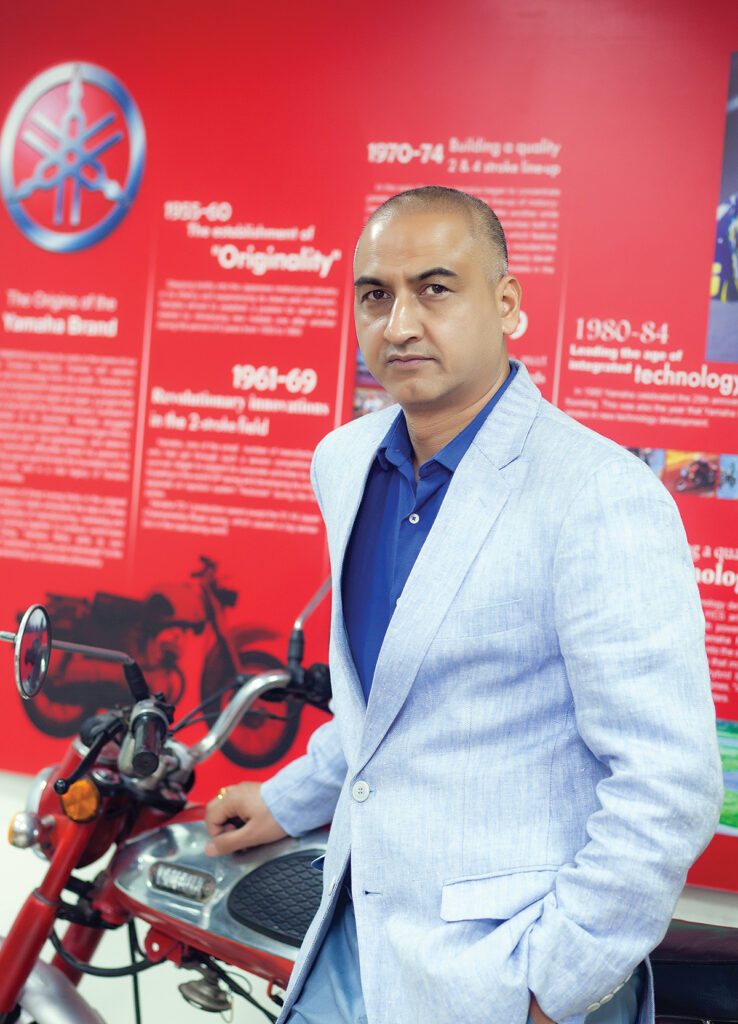
Surakchya Adhikari Co-founder & COO, Thulo.Com
 It sounds like a cliché saying that every crisis is an opportunity. Yes, it is. During a crisis, it is best to simplify complications by applying the basics. We need to focus on our core strengths and try to build on it to come out of a crisis, at the same time being thankful for learning to value the things that actually matter.
In business, we need to instil positivity and motivation in the team. We can then discuss issues and solutions with an open mind. Our team is our brand and how we handle a crisis with the team impacts our brand as well.
It is best to have a crisis plan for the business. Having a plan can lower worries and clear confusions. Panic is not a solution. Identify key staff and communicate with customers and team members.
What can be a better crisis situation than the ongoing Covid 19 due to which the government has imposed a lockdown for the second time.
During the first lockdown, I was completely in a state of confusion as to how to operate the business. At Thulo.com we were delivering groceries and personal care items since 2016, and when the lockdown was announced we were determined to roll up our sleeves and deliver essential items to people’s homes. But how?
At first, I called up major stakeholders and discussed how we could get vehicle passes from concerned authorities. Next, we had to have a new working procedure as we lacked enough resources in terms of four-wheeler delivery vehicles and on-field staff. Also, there were problems in sourcing of products creating gaps in product availability. We were also much concerned about the safety of our customers and staff.
We came up with some decisions regarding our new operations procedure and customer support plans. We then suggested alternate products to customers in case of unavailability, elongated delivery timings, fulfilled customer support mostly via email and chat, provided Personal Protective Equipment (PPE), masks, hand sanitizers to staff, and have switched fully to acceptance of digital payments for touchless transactions only.
By taking these prompt decisions, we were able to build trust among customers. Much of our efforts were directed towards avoiding the risks of virus transmission while also fulfilling the requirements of customers.
Furthermore, apart from changes in internal operations, I managed to be part of a newly formed virtual group of e-commerce companies that dealt together with the concerned ministry on problems encountered with goods delivery.
It sounds like a cliché saying that every crisis is an opportunity. Yes, it is. During a crisis, it is best to simplify complications by applying the basics. We need to focus on our core strengths and try to build on it to come out of a crisis, at the same time being thankful for learning to value the things that actually matter.
In business, we need to instil positivity and motivation in the team. We can then discuss issues and solutions with an open mind. Our team is our brand and how we handle a crisis with the team impacts our brand as well.
It is best to have a crisis plan for the business. Having a plan can lower worries and clear confusions. Panic is not a solution. Identify key staff and communicate with customers and team members.
What can be a better crisis situation than the ongoing Covid 19 due to which the government has imposed a lockdown for the second time.
During the first lockdown, I was completely in a state of confusion as to how to operate the business. At Thulo.com we were delivering groceries and personal care items since 2016, and when the lockdown was announced we were determined to roll up our sleeves and deliver essential items to people’s homes. But how?
At first, I called up major stakeholders and discussed how we could get vehicle passes from concerned authorities. Next, we had to have a new working procedure as we lacked enough resources in terms of four-wheeler delivery vehicles and on-field staff. Also, there were problems in sourcing of products creating gaps in product availability. We were also much concerned about the safety of our customers and staff.
We came up with some decisions regarding our new operations procedure and customer support plans. We then suggested alternate products to customers in case of unavailability, elongated delivery timings, fulfilled customer support mostly via email and chat, provided Personal Protective Equipment (PPE), masks, hand sanitizers to staff, and have switched fully to acceptance of digital payments for touchless transactions only.
By taking these prompt decisions, we were able to build trust among customers. Much of our efforts were directed towards avoiding the risks of virus transmission while also fulfilling the requirements of customers.
Furthermore, apart from changes in internal operations, I managed to be part of a newly formed virtual group of e-commerce companies that dealt together with the concerned ministry on problems encountered with goods delivery.
Kushal Harjani Co-founder & CEO, Doko Recyclers
 It is hard to imagine how much has changed in these six months because of the pandemic. However, I am hopeful that most organisations will be resilient during this time similar to how we have survived the last two turbulent decades. By accepting the situation for what it is, we can look for solutions and even opportunities to propel growth.
We are currently working on such an opportunity at the moment. With the support of the German government (DEG), we are working with waste workers to reduce income loss and infection transmissions by equipping them with PPE kits and necessary training. We are hopeful the project’s focus on sanitation and hygiene will push the waste management sector and government to set higher standards for waste worker dignity and safety. While we are fortunate to receive such a project during these challenging times, it is also a result of the relentless dedication of our team, and our ability to be flexible.
What has really stood out to me though is the rapid digitization brought on by Covid 19 on a national and global level. There is a steep rise in the portion of Nepali urban population who now transact digitally for food, clothes, and services. Moving forward, it will be critical for traditional business houses to digitize and keep up with market trends. Likewise, we have placed an emphasis on remote planning and coordination with our team members and rethinking our digital presence.
Lastly, companies need to understand that this pandemic might last much longer than six months so they need to re-evaluate their existing strategies for growth and investments and adapt accordingly. Planning for longer term contingencies would help develop strategies to reduce your variable expenses, negotiate fixed expenses (rent, salaries, etc.) and focus only on the critical elements required to be agile. What may have worked before Covid 19 may not work anymore, but like any business, the key is in adapting to these changes and to a new way of life.
It is hard to imagine how much has changed in these six months because of the pandemic. However, I am hopeful that most organisations will be resilient during this time similar to how we have survived the last two turbulent decades. By accepting the situation for what it is, we can look for solutions and even opportunities to propel growth.
We are currently working on such an opportunity at the moment. With the support of the German government (DEG), we are working with waste workers to reduce income loss and infection transmissions by equipping them with PPE kits and necessary training. We are hopeful the project’s focus on sanitation and hygiene will push the waste management sector and government to set higher standards for waste worker dignity and safety. While we are fortunate to receive such a project during these challenging times, it is also a result of the relentless dedication of our team, and our ability to be flexible.
What has really stood out to me though is the rapid digitization brought on by Covid 19 on a national and global level. There is a steep rise in the portion of Nepali urban population who now transact digitally for food, clothes, and services. Moving forward, it will be critical for traditional business houses to digitize and keep up with market trends. Likewise, we have placed an emphasis on remote planning and coordination with our team members and rethinking our digital presence.
Lastly, companies need to understand that this pandemic might last much longer than six months so they need to re-evaluate their existing strategies for growth and investments and adapt accordingly. Planning for longer term contingencies would help develop strategies to reduce your variable expenses, negotiate fixed expenses (rent, salaries, etc.) and focus only on the critical elements required to be agile. What may have worked before Covid 19 may not work anymore, but like any business, the key is in adapting to these changes and to a new way of life.
Subin Man Pradhan General Manager, SmartDoko
 The worldwide Covid 19 crisis has forced businesses to expand their digital presence. Despite various challenges posed by the pandemic, it is evident that there is a long term trend towards online shopping and Covid19 has reinforced it further.
While millennials are already comfortable with online shopping, even traditionally adverse customers are now increasingly getting “used to” online experiences. Physical stores are forced to halt operations due to lockdown rules imposed by the government and people themselves are sceptical about leaving their homes to shop even if some stores are open! This is where SmartDoko comes in - it fits strategically into the vision of IMS Group by supporting and delivering all kinds of goods across six cities nationwide. Coupled with its safe payment options via Cellpay and several other payment partners, we believe it could spearhead the online presence.
The greatest challenge for me currently as General Manager of the company has been to implement safety and health measures in the company for the protection of employees and customers in the wake of Covid 19. In this time of crisis, we have received tremendous love and support from our customers along with rapid increase in sales. The key to maintaining the scale of this growth depends on the quality of service provided by SmartDoko, while organisational productivity and ensuring safe delivery of goods requires a healthy environment. This means setting the right safety measures and following up on standards from time to time strictly. We are committed to the health and safety of our employees who manage and deliver products.
The growth in e-commerce is undoubtedly overwhelming; however all the players in the market should equally be responsible for proper safety measures.
The worldwide Covid 19 crisis has forced businesses to expand their digital presence. Despite various challenges posed by the pandemic, it is evident that there is a long term trend towards online shopping and Covid19 has reinforced it further.
While millennials are already comfortable with online shopping, even traditionally adverse customers are now increasingly getting “used to” online experiences. Physical stores are forced to halt operations due to lockdown rules imposed by the government and people themselves are sceptical about leaving their homes to shop even if some stores are open! This is where SmartDoko comes in - it fits strategically into the vision of IMS Group by supporting and delivering all kinds of goods across six cities nationwide. Coupled with its safe payment options via Cellpay and several other payment partners, we believe it could spearhead the online presence.
The greatest challenge for me currently as General Manager of the company has been to implement safety and health measures in the company for the protection of employees and customers in the wake of Covid 19. In this time of crisis, we have received tremendous love and support from our customers along with rapid increase in sales. The key to maintaining the scale of this growth depends on the quality of service provided by SmartDoko, while organisational productivity and ensuring safe delivery of goods requires a healthy environment. This means setting the right safety measures and following up on standards from time to time strictly. We are committed to the health and safety of our employees who manage and deliver products.
The growth in e-commerce is undoubtedly overwhelming; however all the players in the market should equally be responsible for proper safety measures.
Chiranjibi Shah CEO, Yamaha Division, MAW Enterprises
 Crisis management is not just an individual effort, it’s a team effort. So, whenever a crisis emerges, it is important to discuss ways to work through crisis and survive crisis through group discussion with team members. There should be a common understanding between all team members on clarity of actions that is going to be taken. A leader should be able to demonstrate his leadership qualities during crisis.
Because of the pandemic, the way we are functioning both in our personal and professional lives has changed. Rather than doing physical meetings, people are conducting virtual meeting through various apps and technologies like Zoom and Google Meet. Similarly, cost-cutting has been one of the main focus of the companies and operations and many non-functioning departments have been limited. This is what we are doing here in Yamaha as well. 20% of our staff have been working from our head office whereas 80% are working from home itself. During the brief opening between the first and the current lockdown, we had taken all safety precautionary measures necessary in our showrooms and offices for the safety of our employees and customers and will continue this in the future as well if necessary. Health and safety of the people, their families and people surrounding them are of utmost priority.
During any type of crisis, it is important for people to use their money and effort wisely. It is also important for businesses and companies to adapt to the changes brought on by the crisis.
Crisis management is not just an individual effort, it’s a team effort. So, whenever a crisis emerges, it is important to discuss ways to work through crisis and survive crisis through group discussion with team members. There should be a common understanding between all team members on clarity of actions that is going to be taken. A leader should be able to demonstrate his leadership qualities during crisis.
Because of the pandemic, the way we are functioning both in our personal and professional lives has changed. Rather than doing physical meetings, people are conducting virtual meeting through various apps and technologies like Zoom and Google Meet. Similarly, cost-cutting has been one of the main focus of the companies and operations and many non-functioning departments have been limited. This is what we are doing here in Yamaha as well. 20% of our staff have been working from our head office whereas 80% are working from home itself. During the brief opening between the first and the current lockdown, we had taken all safety precautionary measures necessary in our showrooms and offices for the safety of our employees and customers and will continue this in the future as well if necessary. Health and safety of the people, their families and people surrounding them are of utmost priority.
During any type of crisis, it is important for people to use their money and effort wisely. It is also important for businesses and companies to adapt to the changes brought on by the crisis.
Published Date: September 14, 2020, 12:00 am
Post Comment
E-Magazine
RELATED Opinion





